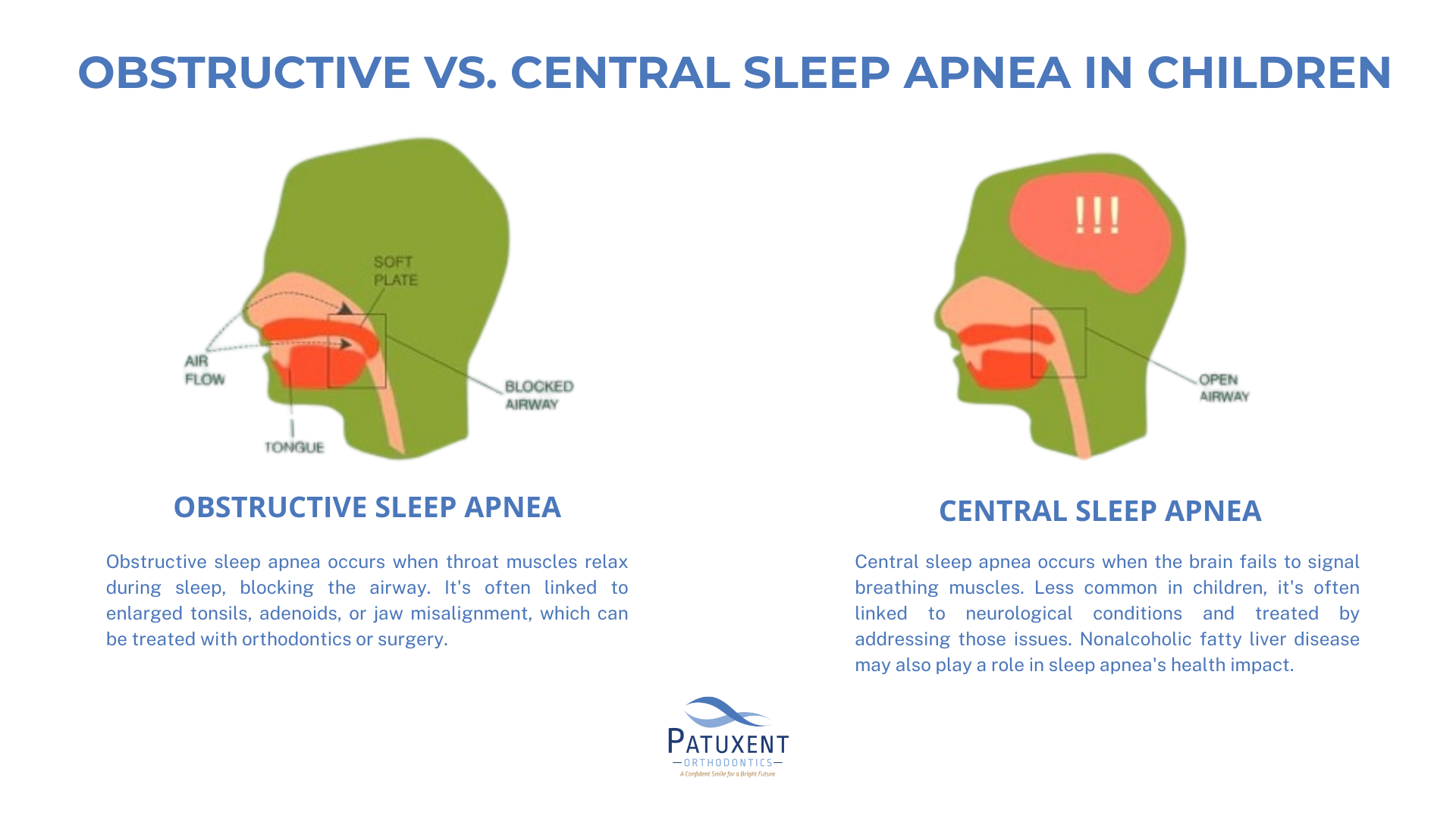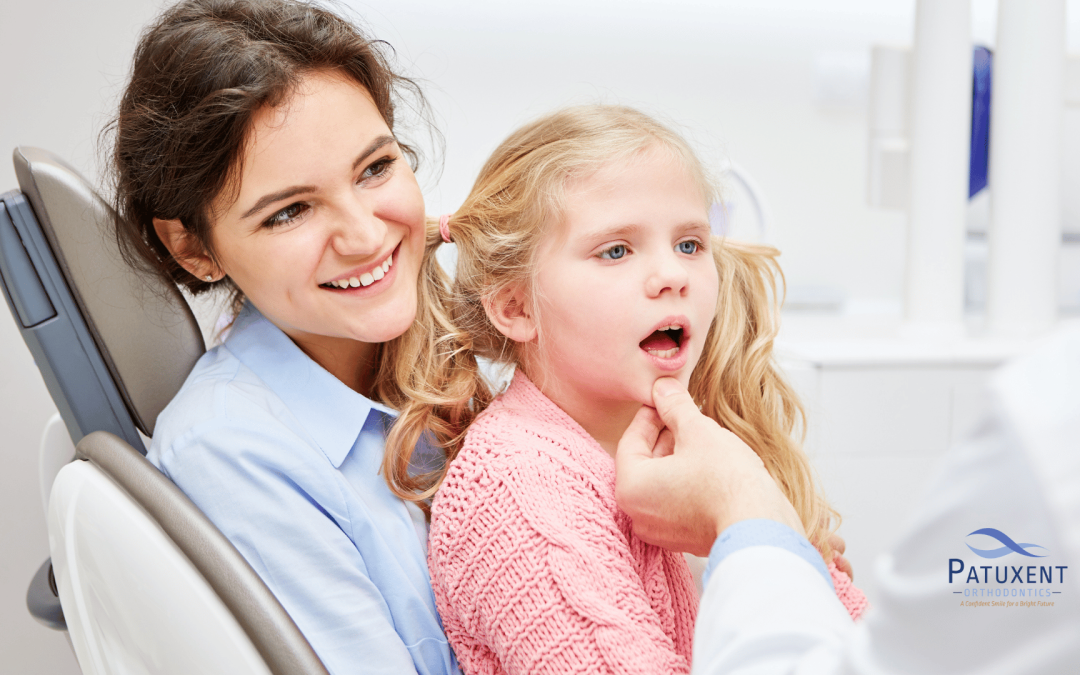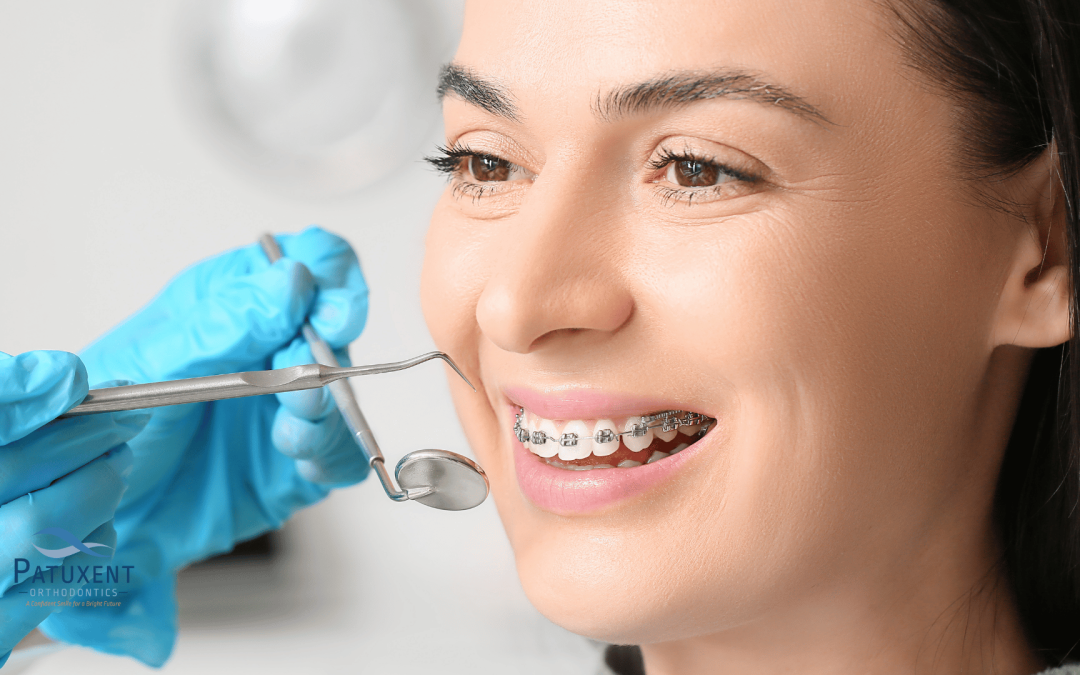A good night’s sleep is vital for a child’s growth, development, and overall well-being.
Pediatric sleep apnea, a condition where a child’s breathing is interrupted during sleep, can significantly impact their health and quality of life. A home sleep apnea test offers a convenient alternative for diagnosing pediatric sleep apnea.
As specialists in dental and orthodontic care, we recognize the crucial role proper alignment of the teeth and jaw can play in addressing this issue. Effective remedies for pediatric sleep apnea range from lifestyle changes to targeted medical treatments.
By exploring both preventive and therapeutic approaches like interceptive orthodontic treatment, we aim to provide comprehensive solutions that support better sleep and overall health for our young patients.
Obstructive vs. Central Sleep Apnea in Children

Sleep apnea is a condition in which a child’s breathing is interrupted during sleep, causing them to wake up frequently throughout the night. These interruptions can be brief, lasting only a few seconds, but they significantly disrupt the sleep cycle.
Children with sleep apnea often experience poor sleep quality, leading to daytime fatigue and other behavioral problems. Obstructive Sleep Apnea (OSA) and Central Sleep Apnea (CSA) are two distinct types of sleep apnea that can affect children:
- Obstructive Sleep Apnea occurs when the muscles at the back of the throat relax excessively during sleep, blocking the airway and causing breathing interruptions. It is commonly linked to issues like enlarged tonsils, adenoids, or misaligned jaws, which can be addressed with orthodontic treatments or surgical interventions.
- Central Sleep Apnea is caused by a failure in the brain’s signals to the muscles that control breathing. This type is less common in children and is often associated with neurological conditions. Treatment typically involves addressing the underlying neurological issues and may include specific medical therapies. Conditions like nonalcoholic fatty liver disease can also be relevant when considering the overall health implications of sleep apnea.
Both types of sleep apnea can disrupt sleep and impact a child’s health, but their management strategies differ based on the underlying cause.
Effective Remedies for Pediatric Sleep Apnea
Treating pediatric sleep apnea effectively involves a combination of lifestyle changes and targeted medical interventions to treat sleep apnea.
Obstructive sleep apnea, the most common form in children, is often managed with adjustments such as weight loss, reducing nasal congestion, and addressing factors like enlarged tonsils or adenoids.
In more complex cases, a sleep specialist may recommend inuous positive airway pressure (CPAP) therapy.
How Snore Guards Help Manage Pediatric Obstructive Sleep Apnea

Snore guards are oral appliances designed to manage pediatric obstructive sleep apnea by keeping the airway open. These devices work by repositioning the lower jaw or tongue to prevent airway collapse during sleep.
Snore guards are particularly effective for children with milder forms of obstructive sleep apnea, reducing loud snoring and improving overall sleep quality.
Palatal Expanders: A Key Treatment for Pediatric Sleep Apnea

Palatal expanders are a crucial tool in treating pediatric sleep apnea, particularly when structural issues contribute to airway obstruction. These devices widen the upper jaw, increasing the space in the nasal cavity and improving airflow.
By addressing the underlying structural problems that narrow the airway, palatal expanders reduce obstructive sleep apnea symptoms such as loud snoring and difficulty breathing. They are often used in conjunction with other treatments to provide a comprehensive approach to managing sleep disorders.
Night Guards As a Non-Invasive Option for Pediatric Sleep Apnea

Night guards offer a non-invasive approach to managing pediatric sleep apnea by preventing airway collapse during sleep. These oral appliances keep the airways open by positioning the lower jaw or tongue in a way that reduces obstruction.
Night guards are particularly useful for children who experience symptoms like loud snoring or excessive daytime sleepiness due to obstructive sleep apnea. While they provide a less invasive alternative to CPAP therapy, it is essential to consult with our expert team to determine their suitability and ensure effective management of the sleep disorder.
When Orthognathic Surgery is Recommended for Severe Pediatric Sleep Apnea

Orthognathic surgery, or jaw surgery, may be recommended for children with severe pediatric sleep apnea when other treatments have proven insufficient. Sleep specialists typically recommend this procedure when obstructive sleep apnea occurs due to significant structural issues in the jaw or facial bones that impede the airway.
Orthognathic surgery aims to reposition the jaw to improve airway alignment and reduce obstruction. It is typically recommended after a thorough evaluation by a sleep specialist to assess the severity of the condition. This surgical intervention is often part of a broader treatment plan that may include other therapies, such as oral appliances.
Combining Lifestyle Changes with Medical Treatments for Pediatric Sleep Apnea

Treating pediatric sleep apnea effectively often involves a multifaceted approach that combines lifestyle changes with medical treatments.
For many children, making adjustments such as weight loss, improving nasal congestion, and establishing healthy sleep routines can significantly alleviate symptoms.
By addressing both behavioral and medical aspects, healthcare providers can create a personalized treatment plan that targets the underlying causes of sleep apnea, reduces daytime sleepiness, and enhances overall sleep quality.
Why Early Intervention Matters in Treating Pediatric Sleep Disorders
Early intervention is crucial in managing pediatric sleep disorders such as sleep apnea. Identifying and treating obstructive sleep apnea and central sleep apnea early can prevent complications like excessive daytime sleepiness, behavioral issues, and impaired cognitive function. Early treatment also helps mitigate the risk of serious complications such as high blood pressure and heart disease.
Take Action against Pediatric Sleep Apnea—Explore Effective Treatments at Patuxent Orthodontics!
Contact Patuxent Orthodontics if snore guards are the solution to your dental woes. Whether you want to learn more about the benefits of orthodontic care or have questions about the process, use our live chat, call (240) 802-7217, or message us through our Contact Us page to connect with our friendly staff today and book a complimentary consultation!
Our office, located at 44220 Airport View Dr., Hollywood, MD 20636, proudly serves Maryland’s Patuxent area, as well as the Greater Washington DC area.
So, if you’re residing in Hollywood, Wildewood, or Leonardtown and are looking for one of the best orthodontists in Maryland, don’t hesitate to visit our office!
We also invite you to keep up with our blog to get answers to many of the frequently asked questions about maintaining your perfect smile, and follow us on Facebook and Instagram to become a part of our smiling community!











